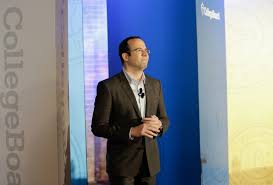The College Board is on the brink of a significant change with the Advanced Placement program by introducing courses designed in collaboration with the business community, not just colleges, and with an emphasis on career development. The impetus for this shift comes from addressing students' disengagement with high school coursework that they perceive as irrelevant to their future careers, as outlined by David Coleman, the CEO of the nonprofit organization during a recent interview.
Acknowledging the increasing dominance of artificial intelligence in the workplace, the College Board is keen on ensuring the continued relevance and value of AP classes. With AI tools now capable of almost acing every AP test, the organization recognizes the need for a fresh approach to maintain students' interest and competitiveness in today's evolving job landscape.
The initial courses under this new initiative, known as AP Career Kickstart, will focus on cybersecurity and business principles/personal finance, reflecting the current demands in the job market. These courses are set to be launched in the 2026-27 academic year, offering students an opportunity to earn college credit while acquiring workforce credentials simultaneously.
The College Board aims to integrate these career-oriented courses seamlessly into high school curricula, making the coursework both enriching and applicable to real-world scenarios. By involving industry partners like the U.S. Chamber of Commerce and tech giant IBM in course design, the organization hopes to bridge the gap between classroom learning and practical job skills.
Furthermore, the organization contemplates expanding this model to other high-demand fields like healthcare, emphasizing the importance of integrating interdisciplinary topics for a comprehensive educational experience. The focus is not only on academic achievements but also on developing essential skills for the future workforce, such as adaptability, resourcefulness, and critical thinking.
The College Board's collaboration with various stakeholders, including businesses, educators, and policymakers, signifies a paradigm shift in high school education towards a more holistic and relevant approach. By incorporating real-world insights and industry expertise into the curriculum, students are better prepared to navigate the dynamic job market and make informed choices about their career paths.
As the landscape of education evolves with the integration of AI and emerging technologies, the College Board remains committed to fostering a balance between traditional academic rigor and practical skills development. The organization's proactive approach in engaging teachers, students, and industry partners underscores its dedication to preparing students for the challenges and opportunities of tomorrow's workforce.
In conclusion, the College Board's initiative to revamp the Advanced Placement program with career-focused courses signals a significant step towards aligning high school education with the demands of the contemporary job market. By fostering collaboration between academia and industry, the organization aims to empower students with the knowledge, skills, and adaptability needed to thrive in an AI-driven world.

